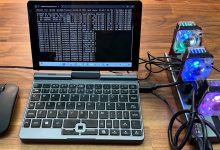Does Apple MacBook Pro Have a Crypto Accelerator? Explained


KEY TAKEAWAYS
- Apple’s MacBook Pro uses custom Apple Silicon (M1–M4) chips integrating high-performance CPU, GPU, and Neural Engines.
- The Secure Enclave acts as a hardware coprocessor for key management and encryption, ensuring security and isolation.
- Apple Silicon CPUs feature instruction-level optimizations for AES and SHA algorithms, offering implicit crypto acceleration.
- CryptoKit, Apple’s API, allows developers to harness hardware-based cryptographic efficiency without manual configuration.
- FileVault, secure boot, and biometric authentication rely heavily on Secure Enclave cryptography.
- The MacBook Pro offers robust cryptographic performance ideal for development, security, and light blockchain use cases.
In recent years, cryptography has become essential not only for securing communication and data storage but also for powering emerging technologies like cryptocurrencies and blockchain applications. This growing reliance on has led to increasing interest in hardware acceleration for cryptographic tasks, specialized hardware that makes encryption, decryption, hashing, and digital signing quicker and more efficient.
For Apple MacBook Pro users and developers, a common question arises: Does the MacBook Pro include a dedicated crypto accelerator to enhance cryptographic operations? This article explores the presence and nature of cryptographic acceleration in Apple’s MacBook Pro and how approaches hardware-based security and cryptography.
What Is a Crypto Accelerator?
A cryptographic accelerator is a hardware component or dedicated circuit designed to offload cryptographic operations from the main CPU. These tasks typically include symmetric and asymmetric encryption, cryptographic hashing, message authentication codes, and digital signature generation and verification. By performing these complex mathematical operations in specialized hardware, crypto accelerators achieve several key benefits:
- Improved Performance: Encryption and hashing can be computationally intensive. Hardware accelerators speed up these tasks, resulting in quicker data encryption/decryption or blockchain hashing.
- Reduced CPU Load: Offloading crypto operations frees CPU resources for other tasks, improving overall system responsiveness.
- Lower Power Consumption: Specialized circuits can perform crypto computations more efficiently than software running on a general-purpose CPU.
- Enhanced Security: Hardware accelerators, especially those isolated from the main processor, reduce risks of key exposure and side-channel attacks.
Many modern processors, especially for servers and mobile devices, include some form of cryptographic acceleration. But how does Apple’s MacBook Pro measure up?
Apple MacBook Pro Hardware Overview
Apple designs its own silicon chips for MacBook Pro models, begining from the M1 generation and continuing with M2, M3, and, most recently, the M4 chip family. These chips integrate CPU cores, GPU cores, specialized Neural Engines for machine learning, media engines for video processing, and other custom hardware.
For example, the Apple M4 Pro chip used in recent MacBook Pros features:
- 12-core CPU (8 performance cores and four efficiency cores)
- 16-core GPU with hardware-accelerated ray tracing
- 16-core Neural Engine
- High memory bandwidth
The architecture is highly integrated and optimized for performance and efficiency, but does not explicitly list a dedicated generic cryptographic accelerator hardware in public specifications. However, Apple products include a component called the Secure Enclave Processor (SEP), which plays a vital role in cryptographic security.
The Secure Enclave: Apple’s Built-In Crypto Coprocessor
The Secure Enclave is a specialized, isolated hardware subsystem embedded in Apple Silicon chips and T2 security chips used in Intel-based Macs. It functions as a separate processor dedicated to security-sensitive tasks like key management, biometric data handling (Touch ID and Face ID), and cryptographic operations related to secure boot, data encryption, and authentication.
Crucial points about the Secure Enclave:
- It has its own memory and storage, inaccessible to the main OS and other software.
- It generates and securely stores cryptographic keys, using hardware protection to prevent tampering or extraction.
- It runs a microkernel operating system (SEPOS) to isolate and secureguard sensitive operations.
- The keys generated and stored in the Secure Enclave are device-unique and cannot be exported.
- It handles encryption and decryption operations involving these keys internally.
Although the Secure Enclave performs cryptographic operations, it primarily focuses on key management, secure authentication, and device integrity rather than serving as a general-purpose cryptographic accelerator for all encryption or hashing tasks.
Does MacBook Pro Have a Dedicated Crypto Accelerator?
Unlike some CPUs that include explicit cryptographic accelerator units or instruction sets dedicated to speeding up hashing or encryption algorithms, Apple Silicon, including MacBook Pros, does not feature a standalone crypto accelerator chip for generic cryptographic tasks. Instead, Apple integrates cryptographic acceleration in several ways:
- Secure Enclave: Dedicated to secure key storage and cryptographic operations related to device security, authentication, and data protection.
- Cryptographic Instruction Optimizations: Apple Silicon’s ARM-based architecture likely includes optimized instructions that accelerate common cryptographic algorithms such as or AES encryption at the CPU level.
- Neural Engine and GPU: While primarily for AI and graphics workloads, these units can theoretically accelerate certain cryptographic algorithms, but are not designed specifically for generic crypto acceleration.
- Software Frameworks: Apple’s CryptoKit leverages hardware acceleration where possible, providing optimized cryptographic functions to developers.
Discussions among developers indicate Apple’s Secure Enclave and ARM architecture offer cryptographic acceleration implicitly, but Apple does not advertise or document a discrete, generic crypto accelerator hardware component like those found in some Intel or AMD processors or dedicated crypto hardware modules in enterprise servers.
Software Utilization of Crypto Acceleration
Apple provides CryptoKit, a high-level API for cryptographic operations on iOS, macOS, and other platforms. CryptoKit is designed to leverage any available hardware acceleration transparently, including Secure Enclave integration, to perform operations like hashing, signing, and encryption efficiently and securely.
For hashing algorithms like SHA-256, hardware acceleration depends on the underlying CPU architecture. Apple Silicon chips viewm to optimize these operations at the instruction level, although debates exist about whether they use dedicated hardware instructions or rely on highly optimized software libraries.
Developers can also take advantage of Secure Enclave-managed keys for cryptographic tasks requiring secure key management and tamper resistance. However, general-purpose cryptographic computation for arbitrary algorithms beyond key handling relies on the main CPU cores.
Practical Cryptographic Use Cases on MacBook Pro
From a user perspective, Apple MacBook Pro employs cryptographic acceleration to support various critical functions:
- FileVault: Apple’s full disk encryption uses hardware-accelerated for transparent disk protection.
- Secure Boot and System Integrity: Verified boot processes rely on the Secure Enclave for cryptographic checks.
- Biometric Authentication: Touch ID processes involve biometric data stored and processed within the Secure Enclave.
- Cryptocurrency Wallets: The Secure Enclave provides a hardware root of trust for , enhancing security against theft or tampering. Open-source projects leverage this capability for hardware-level cosigning without external devices.
- Limited Cryptocurrency Mining: While possible in theory, MacBook Pros do not have the hardware acceleration (like ASICs or dedicated GPU mining) optimized for at scale.
Apple’s Secure Enclave: Redefining Hardware Cryptography on MacBook Pro”
Apple MacBook Pro does not include a standalone general-purpose cryptographic accelerator chip as viewn in some other systems. Instead, Apple relies on a combination of:
- The Secure Enclave Processor is a highly secure, isolated hardware subsystem that accelerates and protects critical cryptographic key management and authentication functions.
- ARM architecture instruction optimizations for cryptographic algorithms executed on the main CPU cores.
- Software frameworks like CryptoKit that transparently leverage available hardware capabilities.
Together, these provide robust cryptographic performance and strong security protections for end users. For most users and developers, Apple’s approach offers efficient and secure cryptographic operations without requiring a traditional crypto accelerator hardware chip.
Thus, while not a conventional crypto accelerator, the MacBook Pro features state-of-the-art hardware security and cryptographic support through Apple Silicon and Secure Enclave, underpinning a secure and performant experience for encryption, authentication, and emerging crypto applications.
FAQ
Does the MacBook Pro have a dedicated crypto accelerator?
No. MacBook Pros don’t include a standalone generic crypto accelerator chip. Instead, they use Apple’s Secure Enclave and CPU instruction-level optimizations for cryptographic efficiency.
What is Apple’s Secure Enclave, and what does it do?
The Secure Enclave is a dedicated, isolated coprocessor that manages cryptographic keys, secures biometric data, and performs encryption tasks for authentication and data protection.
How does Apple accelerate cryptographic operations without a dedicated chip?
Apple uses ARM architecture-level instruction optimizations (e.g., AES and SHA acceleration) along with the Secure Enclave and system-level APIs like CryptoKit for optimized cryptographic performance.
Can the MacBook Pro be used for cryptocurrency mining?
Technically, yes, but it’s inefficient. MacBook Pros lack ASICs or high-throughput GPU optimization, so they’re unsuitable for mining at competitive scales.
What are some cryptographic functions handled by the Secure Enclave?
The Secure Enclave manages Touch ID authentication, FileVault encryption, secure boot verification, and secure Secret key storage for wallets or encrypted data.
Does macOS allow developers to access hardware crypto features?
Yes. Apple’s CryptoKit framework allows developers to perform cryptographic operations efficiently, automatically leveraging available hardware acceleration and Secure Enclave capabilities.
How does Apple’s cryptographic approach compare to Intel or AMD processors?
Unlike Intel’s AES-NI or AMD’s dedicated hardware crypto instructions, Apple uses a unified architecture combining Secure Enclave security with CPU-l







